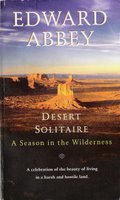Tuesday, February 07, 2006
The Most Beautiful Place on Earth
 I've been reading Edward Abbey's Desert Solitaire lately, which opens with the following passage:
I've been reading Edward Abbey's Desert Solitaire lately, which opens with the following passage:
As a child, when I read the Little House on the Prairie series, I was horrified when the family decided to move from their house in the big woods to the seemingly never-ending rolling, grassy plains. While going to school in the plains states didn't actually prove them to be the nightmare of disorienting, terrifying open flatness my mind had originally conjured up, they weren't home. I draw no comfort from that kind of geography.
Mountains, though, mountains and trees... balm for the soul. Aesthetically, I did not enjoy living in Santiago de Chile, but the bus trip over the Andes on the way to Argentina and back, the three times I went, did me a great deal of good. All the places I liked visiting most there were in the mountains: Aconcagua, Machu Picchu, NP Lauca. Excellent, tall, dramatic mountains, they make me happy; but in the end, I still think the Appalachains are home.
 I've been reading Edward Abbey's Desert Solitaire lately, which opens with the following passage:
I've been reading Edward Abbey's Desert Solitaire lately, which opens with the following passage: This is the most beautiful place on earth.This, of course, got me thinking about where that place might be for me. The closest sentiment I can remember is how I felt whenever I was driving back to North Carolina from college and grad school. From Iowa, the drive is 16 hours, from Michigan, 13, but in both cases, one passes from the Midwest to the East Coast by going over the Appalachain Mountains. No matter how long the rest of the drive had felt before, as soon as I hit the tree-covered Appalachains, which in this case appear first in West Virginia, the feeling that washed over me was "home."
There are many such places. Every man, every woman, carries in heart and mind the image of the ideal place, the right place, the one true home, known or unknown, actual or visionary. A houseboat in Kashmir, a view down Atlantic Avenue in Brooklyn, a gray gothic farmhouse two stories high at the end of a red dog road in the Allegheny Mountains, a cabin on the shore of a blue lake in spruce and fir country, a greasy alley near the Hoboken waterfront, or even, possibly, for those of a less demanding sensibility, the world to be seen from a comfortable apartment high in the tender, velvety smog of Manhattan, Chicago, Paris, Tokyo, Rio, or Rome - there's no limit to the human capacity for the homing sentiment.
As a child, when I read the Little House on the Prairie series, I was horrified when the family decided to move from their house in the big woods to the seemingly never-ending rolling, grassy plains. While going to school in the plains states didn't actually prove them to be the nightmare of disorienting, terrifying open flatness my mind had originally conjured up, they weren't home. I draw no comfort from that kind of geography.
Mountains, though, mountains and trees... balm for the soul. Aesthetically, I did not enjoy living in Santiago de Chile, but the bus trip over the Andes on the way to Argentina and back, the three times I went, did me a great deal of good. All the places I liked visiting most there were in the mountains: Aconcagua, Machu Picchu, NP Lauca. Excellent, tall, dramatic mountains, they make me happy; but in the end, I still think the Appalachains are home.
Comments:
<< Home
I think the author is wrong in equating "the homing sentiment" with aesthetic sensibility and I object to the idea that anyone whose ideal home is a Paris apartment has a "less demanding sensibility" than someone for whom it would be somewhere more picturesque (by which he apparently means not only the desert but also a greasy alley in Hoboken!). What tugs at your heartstrings usually has to do with personal history. Mine is that of the expat, who feels "at home not being at home"; so I can feel "home" both when I revisit London and on returning to places I lived in, e.g. in S. India, where just the smell of the country when I return makes me think "home".
Of course, I would have to read the book to find out why Edward Abbey responds in this way to deserts!
Of course, I would have to read the book to find out why Edward Abbey responds in this way to deserts!
Oh, I don't think Abbey ever claims to not be an outdoors, anti-urban elitist. He's kind of amusing in his unapologetic opinionatedness.
As for the feeling of "at home not being at home", I had periods of that after returning from Japan. It was almost a relief to get on the elevator with most of the German department around me, putting me back in a situation where I could only catch a word or two of what people were saying.
Post a Comment
As for the feeling of "at home not being at home", I had periods of that after returning from Japan. It was almost a relief to get on the elevator with most of the German department around me, putting me back in a situation where I could only catch a word or two of what people were saying.
<< Home
